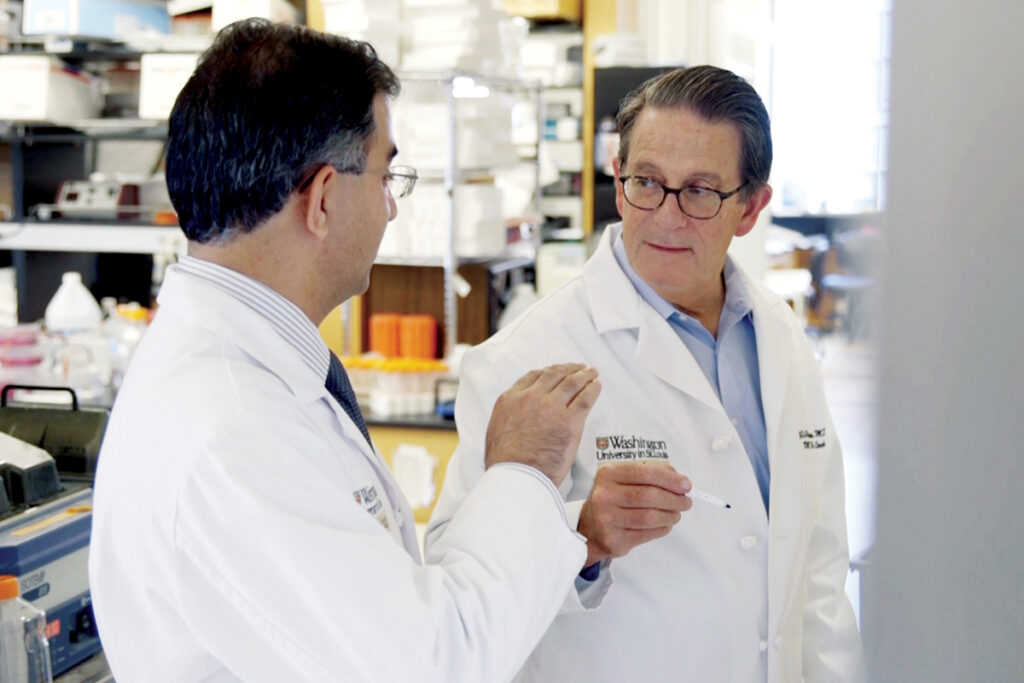This summer, the latest generation of CAR T-cell therapies for patients diagnosed with lymphoma, myeloma or leukemia get underway in clinical trials at Siteman Cancer Center at Barnes-Jewish Hospital and Washington University School of Medicine in St. Louis.
The cancer center was one of the first in the U.S. to offer CAR T-cell therapy for the treatment of certain blood cancers, in 2015. Washington University researchers at Siteman were involved in the earliest clinical trials that led to FDA approval of the first of these targeted cellular immunotherapies.
Now, first-in-human clinical trials that begin in the next several months will evaluate three universal CAR T-cell therapies for T-cell acute lymphoblastic leukemia (T-ALL), acute myeloid leukemia (AML) and T-cell non-Hodgkin lymphoma (T-NHL). All three immunotherapies were generated in the laboratory of John DiPersio, MD, PhD, chief of the Division of Oncology at the School of Medicine, and an internationally recognized oncologist and director of the Center for Gene and Cellular Immunotherapy.
“We are trying to find new cellular targets using genomics and proteomics and, as a result, we have developed new CARs for the treatment of several hematological malignancies, including lymphoma, leukemia and multiple myeloma,” said DiPersio, who also is deputy director of Siteman.
CAR T cells, or chimeric antigen receptor T cells, have been among the most promising cancer treatment options for relapsed or refractory blood cancers and some solid tumors. They are created through a rigorous manufacturing process that involves the collection of a patient’s immune cells — specifically, a type of white blood cell called a T cell — which are then re-engineered in a lab to target certain types of cancer. In just the past three years, CAR T-cell therapy has been proven successful in the treatment of some refractory hematological malignancies, extending the time for remission.
Currently, there are five FDA-approved CAR T-cell standard of care therapies available for various types of lymphoma, leukemia and multiple myeloma.
“What sets our Center for Gene and Cellular Immunotherapy apart is that we not only offer these treatments, but we have the capability to manufacture CAR T cells for our patients onsite,” said Armin Ghobadi, MD, clinical director of the center.
There are two main advantages of this “point-of-care” manufacturing, he said:
- The interval between leukapheresis and start of lymphodepleting chemotherapy, which currently takes three to four weeks for standard of care, FDA-approved CAR Ts, can be shortened to two to four days.
- Point-of-care-manufactured CAR T cells can be administered fresh, while centrally manufactured standard-of-care CAR Ts must go through a freeze and thaw process.
Ghobadi notes that since the first CAR T-cell immunotherapy was approved in 2017, the pace of advancement in the field of cellular immunotherapies has been incredibly rapid. Now, hundreds of CAR T-cell clinical trials are initiated each year. The push is to enhance the cancer-killing properties of CAR T cells, broaden their use in other hematologic malignancies and solid tumors, and improve their safety features. Other cells, including natural killer (NK) cells, have been used with or without gene modification (NK and CAR NK cells). Memory-like NK cells were first used for treatment of patients with AML by Todd Fehniger, MD, PhD, of Washington University and Siteman, in 2009. By 2020, the first memory-like NK cells engineered with CAR were developed at the Center for Gene and Cellular Immunotherapy.
“We have the advantage in that we offer all approved standard-of-care immunotherapies and have a robust clinical and translational research program that has made it possible to accelerate the pace of discovery,” Ghobadi said.
Researchers at the Center for Gene and Cellular Immunotherapy also are tackling cytokine release syndrome (CRS), a systemic inflammatory syndrome that is a significant complication of immunotherapy treatments. “We have two trials opening soon that will investigate the effectiveness of two specific drugs, itacitinib and duvelisib, in blocking CRS,” DiPersio said.
Said Ghobadi, “In addition, we’re also focused on neurotoxicity, another significant side effect. In pre-clinical trials, we have identified a biomarker that could potentially predict which patients are at risk for neurotoxicity even before starting CAR T-cell therapy.”
He adds, “The newer generation of CARs are going after multiple targets. We are one of only a few centers in the world focused on T-cell lymphoma, and we have robust programs for leukemia and multiple myeloma — but we are always working to widen applications for other cancers.”
For more information about the Center for Gene and Cellular Immunotherapy at Siteman Cancer Center and Washington University School of Medicine, visit cellularimmunotherapy.wustl.edu.
